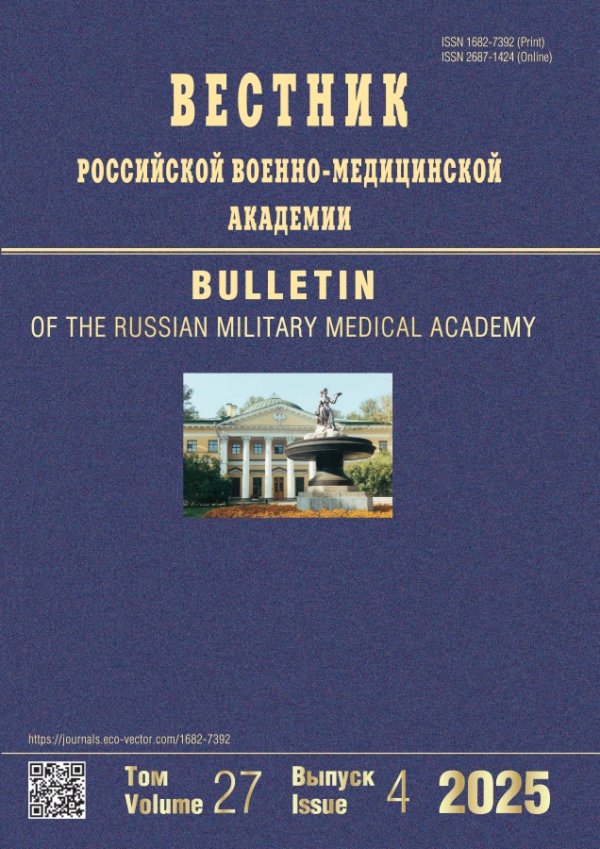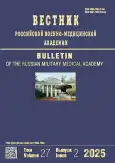Impact of Anticytokine Therapy on Acute Phase of Novel Coronavirus Infection on Ischemic Heart Disease
- Authors: Litvinenko R.I.1, Kryukov E.V.1, Yazenok A.V.1, Gaiduk S.V.1
-
Affiliations:
- Kirov Military Medical Academy
- Issue: Vol 27, No 2 (2025)
- Pages: 185-192
- Section: Original Study Article
- URL: https://journal-vniispk.ru/1682-7392/article/view/310245
- DOI: https://doi.org/10.17816/brmma649332
- EDN: https://elibrary.ru/JHMFYJ
- ID: 310245
Cite item
Abstract
BACKGROUND: Recent studies showed a causal relationship between inflammation and atherogenesis with underlying ischemic heart disease. A novel coronavirus infection has been found to trigger a cytokine storm. Various anticytokine therapies have been used for the treatment. However, the impact of these interventions on ischemic heart disease remains unclear.
AIM: This study aimed to assess the impact of various anticytokine treatments initiated in the acute phase of novel coronavirus infection on ischemic heart disease post-COVID.
METHODS: The study included 272 patients with a history of ischemic heart disease. The patients had received various anticytokine therapies for novel coronavirus infection. They were followed up after recovering from novel coronavirus infection. The patients were stratified into two groups based on worsening of underlying ischemic heart disease (worsening vs no worsening).
RESULTS: The worsening of ischemic heart disease was significantly associated with novel coronavirus infection severity (χ2df = 2 = 28.406; p < 0.0001) and sex (in males, χ2df = 1 = 7.310; p = 0.007). Patients who had severe novel coronavirus infection and received combination anticytokine therapy in the acute phase of the infection were less likely to experience worsening of ischemic heart disease compared to those who received monotherapy for cytokine storm (p1,4 = 0.016; p3,4 = 0.024). A proposed model with a 68.8% accuracy rate estimates the worsening probability of ischemic heart disease after novel coronavirus infection using several factors, including sex, age, severity of symptoms, and concurrent treatment.
CONCLUSION: The findings indicate that inflammation plays a crucial role in ischemic heart disease and that the severity of novel coronavirus infection has a significant impact on its clinical course. Combination treatment for the cytokine storm that is associated with novel coronavirus infection in patients with underlying ischemic heart disease is correlated with better prognosis.
Full Text
##article.viewOnOriginalSite##About the authors
Ruslan I. Litvinenko
Kirov Military Medical Academy
Author for correspondence.
Email: vmeda-nio@mil.ru
ORCID iD: 0000-0001-8435-9958
SPIN-code: 8981-4000
MD, Cand. Sci. (Medicine)
Russian Federation, Saint PetersburgEvgeny V. Kryukov
Kirov Military Medical Academy
Email: vmeda-nio@mil.ru
ORCID iD: 0000-0002-8396-1936
SPIN-code: 3900-3441
MD, Dr. Sci. (Medicine), Professor
Russian Federation, Saint PetersburgArkady V. Yazenok
Kirov Military Medical Academy
Email: vmeda-nio@mil.ru
ORCID iD: 0000-0002-1334-8191
SPIN-code: 4107-1280
MD, Dr. Sci. (Medicine), Associate Professor
Russian Federation, Saint PetersburgSergey V. Gaiduk
Kirov Military Medical Academy
Email: gaiduksergey@mail.ru
ORCID iD: 0000-0003-1524-9493
SPIN-code: 8602-4922
MD, Dr. Sci. (Medicine), Associate Professor
Russian Federation, Saint PetersburgReferences
- Gumilevskiy BYu, Moskalev AV, Gumilevskay OP, et al. Features of immunopathogenesis of a new coronavirus infection. Bulletin of the Russian Military Medical Academy. 2021;23(1):187–198. doi: 10.17816/brmma.63654 EDN: XYIVAY
- Zaitsev AA, Chernov SA, Kryukov EV, et al. Practical experience in managing patients with the new coronavirus infection COVID-19 in a hospital (preliminary results and recommendations). Attending Physician. 2020;6: 74–79. (In Russ.) doi: 10.26295/OS.2020.41.94.014 EDN: SVXAJC
- Andreenko AA, Andreichuk YuV, Arsent’ev VG, et al. The infection caused by SARS-COV-2. EV Kryukov, editor. Saint Petersburg; 2023. 260 p. EDN: QFKFPFCOVID-19 (In Russ.)
- Tsybulkin NA, Tukhvatullina GV, Tsybulkina VN, Abdrakhmanova A.I. Inflammatory mechanisms in the pathogenesis of atherosclerosis. Practical medicine. 2016;(4-2):165–169. EDN: WKBHFJ
- De Stefano L, Bobbio-Pallavicini F, Manzo A, et al. A “window of therapeutic opportunity” for anti-cytokine therapy in patients with coronavirus disease 2019. Front Immunol. 2020;11:572635. doi: 10.3389/fimmu.2020.572635
- Sukhomlinova IM, Bakulin IG, Kabanov MYu. Predicting the efficacy of anti-inflammatory therapy in COVID-19. RMJ. 2023;(2):72–76. EDN: QVFSKR
- Bunova SS, Okhotnikova PI, Skirdenko YuP, et al. COVID-19 and cardiovascular comorbidity: novel approaches to reduce mortality. Cardiovascular Therapy and Prevention. 2021;20(4):122–128. doi: 10.15829/1728-8800-2021-2953 EDN: WOPWRT
- Tajmirriahi M, Sami R, Mansourian M, et al. The clinical manifestation and outcome of COVID-19 in patients with a history of ischemic heart disease; a retrospective case-control study. BMC Cardiovascular Disorder. 2023;23:241 doi: 10.1186/s12872-023-03256-1
- Sholter DE, Armstrong PW. Adverse effects of corticosteroids on the cardiovascular system. Can J Cardiol. 2000;16(4):505–511.
- Deng H-W, Mei W-Y, Xu Q, et al. The role of glucocorticoids in increasing cardiovascular risk. Front Cardiovasc Med. 2023;10:1187100. doi: 10.3389/fcvm.2023.1187100
- Dzherieva IS, Volkova NI, Davidenko IY, et al. Glucocorticoid therapy is a risk factor for cardiovascular diseases. Medical Herald of the South of Russia. 2022;13(3):93–106. doi: 10.21886/2219-8075-2022-13-3-93-106 EDN: UTOFEY
- Belletti A, Campochiaro C, Marmiere M, et al. Efficacy and safety of IL-6 inhibitors in patients with COVID-19 pneumonia: a systematic review and meta-analysis of multicentre, randomized trials. Ann Intensive Care. 2021;11:152. doi: 10.1186/s13613-021-00941-2
- Efficacy of interleukin-6 inhibitors as a tool for preventive anti-inflammatory therapy for COVID-19. Good Clinical Practice. 2024;(1):4–16. doi: 10.37489/2588-0519-2024-1-4-16 EDN: DSVZBR
- Popkova TV, Novikova DS, Nasonov EL Interleukin-6 inhibition and cardiovascular disease in patients with rheumatoid arthritis. Therapeutic archive. 2016;88(5):93–101. doi: 10.17116/terarkh201688593-101 EDN: VZBXQN
- Beloglazov VA, Goncharov GS, Shaduro DV. Janus-Kinase inhibitors. Perspective and experience of application in the global clinical practice. TMBV. 2018;21(4):95–104. EDN: ZCQDVJ
- Jain NK, Tailang M, Jain HK, et al. Therapeutic implications of current Janus kinase inhibitors as anti-COVID agents: A review. Front Pharmacol. 2023;14:1135145. doi: 10.3389/fphar.2023.1135145
- Song Y-K, Lee G, Hwang J, et al. Cardiovascular risk of janus kinase inhibitors compared with biologic disease-modifying antirheumatic drugs in patients with rheumatoid arthritis without underlying cardiovascular diseases: a nationwide cohort study. Front Pharmacol. 2023;14:1165711. doi: 10.3389/fphar.2023.1165711
- Shah JT, Shah KT, Femia AN, et al. Cardiovascular risk management in patients treated with janus kinase inhibitors. J Cardiovasc Pharmacol. 2024;83(5):392–402. doi: 10.1097/FJC.0000000000001470









